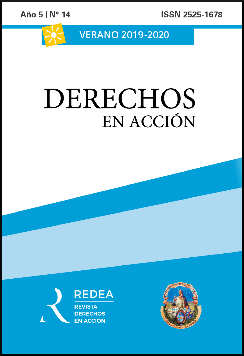Derecho, Marxismo y Método
DOI:
https://doi.org/10.24215/25251678e359Palabras clave:
Derecho, Estado, Derechos humanos, marxismo, método, lucha de clasesResumen
El Derecho es crucial para el mantenimiento y la reproducción del capitalismo. A pesar de que Marx nunca produjo una teoría integral del Derecho, el Estado y los derechos, hay mucho de ello en su trabajo y en la tradición marxista más amplia, que pueden ayudarnos a entender la naturaleza y el rol del Derecho en el capitalismo contemporáneo. Este artículo esboza algunos de los recursos claves desde el interior de la teoría marxista, que pueden ayudarnos a desarrollar una comprensión marxista del Derecho, el Estado y los derechos en la actualidad. Específicamente el foco se centra en la cuestión del método, extrayendo tres hilos claves del propio trabajo de Marx: (i) la importancia del análisis dialéctico materialista, (ii) la naturaleza históricamente específica y transitoria del capitalismo, y (iii) la centralidad del antagonismo de la lucha de clases. El argumento propuesto aquí, en suma, es que las explicaciones marxistas del Derecho, el Estado y los derechos deberían poner en primer plano de referencia estos puntos analíticos, para hacer inteligible el rol del Derecho, y comenzar a esbozar cómo los movimientos hacia el cambio social fundamental podrían entenderse y ligarse con el Derecho.
Referencias
Althusser, Louis (1971). On Ideology. London: Verso.
Anderson, Perry (1979). Considerations on Western Marxism. London: Verso.
Berman, Marshal (1999). Adventures in Marxism. London: Verso.
Cain, Maureen (1974). The Main Themes in Marx’ and Engels’ Sociology of Law. British Journal of Law and Society 1 (2): 136-148.
Cain, Maureen and Alan Hunt (1979). Marx and Engels on Law. London: Academic Press.
Chase, Anthony (1997). Law and History. New York: The New Press.
Dicey, Albert V. (1982/1915). Introduction to the Study of the Law of the Constitution. Indianapolis, en: Liberty Fund.
Draper, Hal (1977) Karl Marx’s Theory of Revolution – Volume 1: State and Bureaucracy.
New York: Monthly Review Press.
Engels, Friedrich (1890). Letter to Conrad Schmidt. In MECW Volume 49, 57-65. London: Lawrence & Wishart.
Engels, Friedrich (1886). Ludwig Feuerbach and the End of Classical German Philosophy. In MECW Volume 26, 353-398. London: Lawrence & Wishart.
Fine, Bob (1984). Democracy and the Rule of Law: Marx’s Critique of the Legal Form. London: Pluto.
Harel, Alon (2014). Why Law Matters. Oxford: Oxford University Press.
Harvey, David (2012). History Versus Theory: A Commentary on Marx’s Method in Capital. Historical Materialism 20 (2):3-38.
Holloway, John (2012). Crisis and Critique. Capital & Class 36(3) 515-519.
Hunt, Alan (2004). Getting Marx and Foucault into Bed Together. Journal of Law and Society 31 (4): 592-609.
Hunt, Alan (1992). A Socialist Interest in Law. New Left Review I/192: 105-119.
James, C.L.R (1999). Marxism for Our Times. In Marxism For Our Times: C.L.R. James on Revolutionary Organization, edited by Martin Glaberman, 43-66. Jackson, MS: University Press of Mississippi.
Lukács, Georg (1971). History and Class Consciousness. Cambridge MA: MIT Press.
Lukács, Georg (1970). Lenin: A Study in the Unity of His Thought. London. New Left Books.
Marx, Karl (1867). Capital: A Critique of Political Economy: Volume One. London: Penguin.
Marx, Karl (1864). Inaugural Address of the Working Men’s International Association. In MECW Volume 20, 5-13. London: Lawrence & Wishart.
Marx, Karl (1859). A Contribution to the Critique of Political Economy. In MECW Volume 29, 257-507. London: Lawrence & Wishart.
Marx, Karl (1857/58). Grundrisse. London: Penguin.
Marx, Karl and Friedrich Engels (1848). Manifesto of the Communist Party. In MECW Volume 6, 477-519. London: Lawrence & Wishart
Marx, Karl (1844). Contribution to the Critique of Hegel’s Philosophy of Right. In MECW Volume 3, 175-187. London: Lawrence & Wishart.
Marx, Karl and Friedrich Engels (1845/46). The German Ideology. In MECW Volume 5, 19- 539. London: Lawrence & Wishart.
Mészáros, István (1995). Beyond Capital. London: The Merlin Press.
Mohun, Simon (2016). Class Structure and US Personal Income Distribution, 1918-2011. Metroeconomica 67 (2): 334-363.
Montesquieu, Charles-Louis (1949/1748). The Spirit of the Laws. New York: Hafner Publishing Company.
O’Connell, Paul (2018). On the Human Rights Question. Human Rights Quarterly 40 (4)
[forthcoming].
Ollman, Bertell (2003). Dance of the Dialectics: Steps in Marx’s Method. Chicago: University of Illinois Press.
Pashukanis, Evgeny (1978). Law and Marxism: A General Theory. London: Pluto.
Poulantzas, Nicos (1978). State, Power, Socialism. London: New Left Books.
Renner, Karl (1949). The Institutions of Private Law and Their Social Function. London: Routledge and Kegan Paul.
Rühl, Otto (1929). Karl Marx: His Life and Works. London: Allen and Unwin. Steinberg, Marc. 2016. England’s Great Transformation. Chicago: Chicago University Press.
Sweezy, Paul (1946). The Theory of Capitalist Development. London: Dennis Dobson Ltd.
Thompson, Edward P. (1975). Whigs and Hunters: The Origins of the Black Act. New York: Pantheon Books.
Wood, Ellen Meiksins (1988). Capitalism and Human Emancipation. New Left Review I/167: 3-20.
Wright, Ian (2005). The Social Architecture of Capitalism. Physica A 346: 589-620.
Descargas
Publicado
Número
Sección
Licencia
Todo el material publicado en la revista lo hace bajo una licencia Creative Commons de Reconocimiento-No Comercial-Sin Obra Derivada (CC BY-NC-ND) 4.0



.jpg)






























